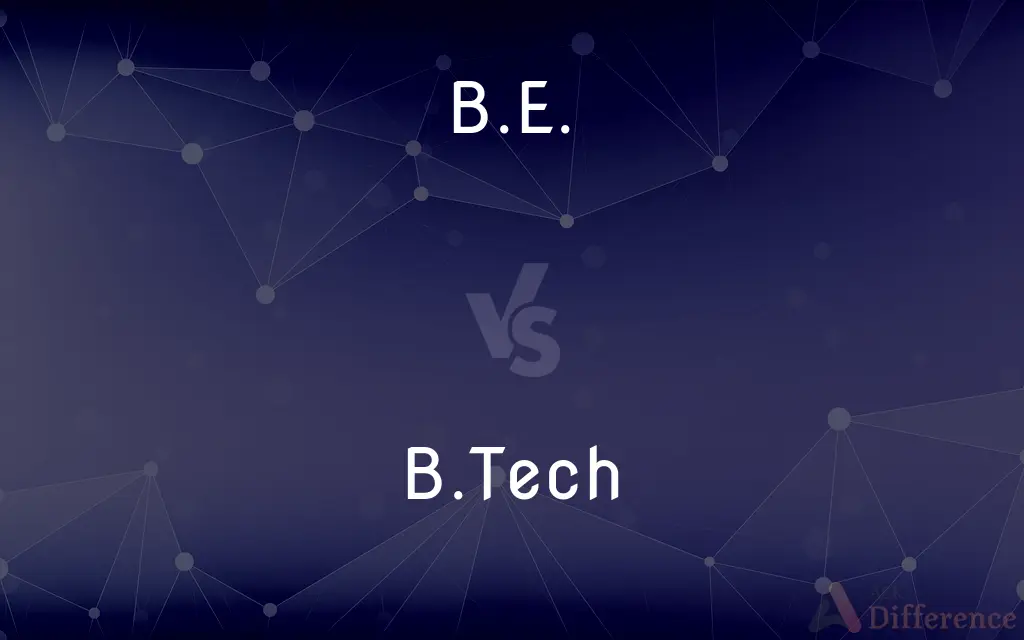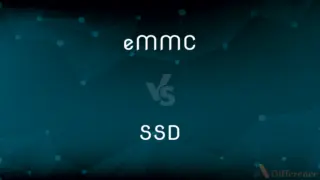B.E. vs. B.Tech — What's the Difference?
By Tayyaba Rehman & Fiza Rafique — Published on February 2, 2024
B.E. (Bachelor of Engineering) focuses on theoretical knowledge, while B.Tech (Bachelor of Technology) is more practical and application-oriented, though both are undergraduate degrees in engineering.

Difference Between B.E. and B.Tech
Table of Contents
ADVERTISEMENT
Key Differences
B.E. programs often emphasize a comprehensive understanding of engineering principles and theoretical foundations, making it ideal for students interested in research and development. On the other hand, B.Tech curriculum is designed to impart practical, hands-on experience, preparing students for direct application of skills in engineering and technology fields.
Graduates with a B.E. degree may find themselves inclined towards analytical, research-based roles, and higher studies, given the theory-intensive nature of the program. Conversely, B.Tech graduates are often considered ready for the industry, taking on roles that require immediate technical expertise and practical problem-solving skills.
B.E. courses often delve deeper into the mathematical and scientific theories underlying engineering concepts, aiming to develop a solid theoretical base. B.Tech courses, however, place greater emphasis on practical, real-world applications of engineering principles, often involving extensive lab work and projects.
In some regions, a B.E. degree is perceived as more traditional and theory-oriented, sometimes preferred for research roles or further academic pursuits. B.Tech, being more contemporary and practical, is typically favored by industries seeking professionals ready to handle the technological challenges of the modern workplace.
B.E. programs may offer a wide range of specializations, focusing on the breadth and depth of engineering disciplines. B.Tech programs, while also offering specializations, tend to be more flexible, adapting quickly to the changing demands and emerging trends in the technology sector.
ADVERTISEMENT
Comparison Chart
Curriculum
Theory and principle-focused
Practical and application-oriented
Career Orientation
Research, analytical, and academic roles
Industry-ready, technical, and practical roles
Academic Approach
Deep theoretical foundation
Hands-on experience and real-world application
Industry Perception
Traditional, theory-oriented
Modern, practical, industry-friendly
Specialization
Broad range of engineering disciplines
Flexible, aligned with industry trends
Compare with Definitions
B.E.
B.E. is an academic degree focusing on the theoretical aspects of engineering.
She pursued a B.E. in Mechanical Engineering to deepen her understanding of thermodynamics.
B.Tech
B.Tech focuses on the practical aspects of technology and its implementation.
Her B.Tech project involved developing a prototype for an innovative medical device.
B.E.
B.E. prepares students for a diverse range of engineering fields, offering extensive specialization options.
After completing his B.E. in Civil Engineering, he specialized in structural design.
B.Tech
B.Tech programs are known for their industry-aligned curriculum and skill-oriented training.
His B.Tech in Chemical Engineering included extensive training in process automation.
B.E.
B.E. programs often lead to careers in research, development, and higher education.
Her B.E. in Electrical Engineering paved the way for a career in semiconductor research.
B.Tech
B.Tech prepares students for immediate entry into the technology-driven industry.
After his B.Tech in Information Technology, he joined a tech startup as a system analyst.
B.E.
B.E. emphasizes foundational engineering principles and scientific theory.
His B.E. degree provided a strong base for his research in renewable energy technologies.
B.Tech
B.Tech is a degree program that combines engineering principles with technological applications.
He applied for a B.Tech in Computer Science to gain hands-on experience in software development.
B.E.
B.E. is recognized globally and valued for its comprehensive and rigorous curriculum.
His B.E. degree was instrumental in securing a position at a leading aerospace firm.
B.Tech
B.Tech emphasizes emerging technologies and prepares students for future industry challenges.
Her B.Tech in Renewable Energy Technology focused on the latest innovations in solar power.
Common Curiosities
Can a B.E. graduate pursue a career in the industry?
Yes, B.E. graduates can pursue industry careers, particularly in roles that value analytical and foundational engineering skills.
What is the main focus of a B.Tech degree?
B.Tech emphasizes practical, hands-on experience and technological applications.
How do B.E. and B.Tech differ in terms of curriculum?
B.E. curriculum is more theoretical, while B.Tech curriculum is more application-oriented.
What is the main focus of a B.E. degree?
B.E. focuses on the theoretical and foundational aspects of engineering.
Can a B.Tech graduate pursue higher studies?
Yes, B.Tech graduates can pursue higher studies, especially programs that value practical and technical expertise.
Which degree is better for a career in industry, B.E. or B.Tech?
B.Tech is often preferred for industry roles due to its practical and technological focus.
Do B.E. and B.Tech have different duration or course structures?
The duration is typically the same, but course structures may differ, with B.E. having more theoretical courses and B.Tech having more practical and technical courses.
Can students switch between B.E. and B.Tech programs?
Switching between programs is possible but depends on the university's policies and the equivalence of courses.
How important is accreditation for B.E. and B.Tech programs?
Accreditation is crucial for ensuring the quality of both B.E. and B.Tech programs and for the global recognition of the degree.
How does the choice between B.E. and B.Tech affect job prospects?
Job prospects depend on industry demands; B.Tech may offer an edge in technology-driven sectors, while B.E. may be preferred in traditional engineering fields.
Are B.E. and B.Tech degrees recognized internationally?
Yes, both B.E. and B.Tech degrees are recognized internationally, but recognition can vary based on specific university accreditation and country.
Do B.E. and B.Tech graduates have different continuing education options?
Continuing education options are vast for both, but B.E. graduates may lean towards theoretical and research-based programs, while B.Tech graduates may prefer technical and application-oriented programs.
How do B.E. and B.Tech degrees impact the skill set of graduates?
B.E. graduates typically develop a strong theoretical and analytical skill set, while B.Tech graduates acquire practical and technical skills aligned with industry requirements.
Which degree is better for a career in research, B.E. or B.Tech?
B.E. is generally considered better for research-oriented careers due to its focus on theoretical knowledge.
Are internship opportunities different for B.E. and B.Tech students?
Internship opportunities may differ, with B.Tech students often getting more hands-on, technical roles, and B.E. students getting roles focusing on research and theoretical aspects.
Share Your Discovery

Previous Comparison
Cold Sore vs. Pimple
Next Comparison
eMMC vs. SSDAuthor Spotlight
Written by
Tayyaba RehmanTayyaba Rehman is a distinguished writer, currently serving as a primary contributor to askdifference.com. As a researcher in semantics and etymology, Tayyaba's passion for the complexity of languages and their distinctions has found a perfect home on the platform. Tayyaba delves into the intricacies of language, distinguishing between commonly confused words and phrases, thereby providing clarity for readers worldwide.
Co-written by
Fiza RafiqueFiza Rafique is a skilled content writer at AskDifference.com, where she meticulously refines and enhances written pieces. Drawing from her vast editorial expertise, Fiza ensures clarity, accuracy, and precision in every article. Passionate about language, she continually seeks to elevate the quality of content for readers worldwide.
















































